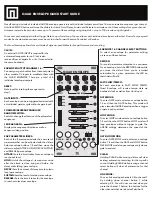
18
To delete user calibration, go to the user calibration mode
and set to 0 for Num. Of points:
12. Technical maintenance, special conditions of
operation
On the whole, hardness testers do not require any special maintenance. However,
for the purpose of hardness tester stable operation, regular maintenance is
advisable.
12.1. Probe maintenance
Clean hard metal ball and diamond pyramid from dust, mud and oil traces. Use
soft cloth impregnated with alcohol solution.
Check the probe operation regularly by conducting hardness measurements on
hardness reference blocks. Do not use reference test block with expired period
between verifications (more than 2 years).
12.2. Information processing unit maintenance
To clean from any pollution, use soft dry cloth. Do not use the water, since the
hardness tester is neither spray-proof nor water-proof due to the joints on its body.
Do not use any solvents, they can damage indication signs and writings on the
front and back sides of the body.
12.3. Battery maintenance
The battery average life is not less than 3years. The battery used in compliance
with the "C" or "AA" international standard. It is done for the convenience of its
replacement when it is required or sharp reduction of the continuous operation
time (paragraph 3.6) independently of the country. Replacement is possible only
by the battery with similar characteristics in compliance with the marking on it.
From environmental protection point of view, the best thing is to use the battery.
12.4. Storage
12.4.1. Hardness tester shall be kept in the carry case, the probe and the batterys
shall be disconnected.
12.4.2. If hardness tester is kept in the carry case for than 14 days, the battery shall
be taken out from its compartment in the information processing unit.
12.4.3. It is recommended to keep hardness testers in closed premises with the
relative humidity not more than 80%, there shall be no mold, paints, acids,
chemical agents and other chemicals, the evaporation of which my give a harmful
effect. Sharp fluctuations of temperature and humidity which can result in dew
formation are not allowed.
12.5. Transportation
12.5.1. Hardness tester transportation in the carry case shall be only in closed
vehicles, where the possibility of mechanical damage or atmospheric precipitation
is excluded.


































